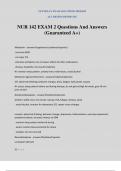©FYNDLAY EXAM SOLUTIONS 2024/2025
ALL RIGHTS RESERVED.
NUR 142 EXAM 2 Questions And Answers
(Guaranteed A+)
Melatonin - answer✔supplement (sedative/hypnotic)
-increases REM
-no major S/E
-interacts w/Valerian can increases effects of other medications
-drowsy, headache, dry mouth (Valerian)
NI: monitor sleep pattern, anxiety level, med history, avoid alcohol
Melatonin Agonist (Rozerem) - answer✔sedative/hypnotic
S/E: abnormal thinking, behavior changes, dizzy, fatigue, hallucinate, nausea
NI: assess sleep pattern before and during therapy, do not give w/high fat meals, give 30 min
prior to bed
Nonbenzodiazepines - answer✔Sedative/hypnotics
Ambien: stuffy nose, dry mouth, nausea, H/A, fatigue, drowsy, weak
-avoid alcohol, monitor for depression S/S, report vision changes.
Lunesta: abnormal thinking, behavior change, depression, hallucinations, next day impairment,
peripheral edema, increases latency to REM
-monitor sleep pattern before & during
-assess mental status+potential for abuse
-swallow, do not crush pill
Benzodiazepines - answer✔Sedative/hypnotic
Lorazepam (Ativan)
1|Page
, ©FYNDLAY EXAM SOLUTIONS 2024/2025
ALL RIGHTS RESERVED.
Temazepam (Restoril)
Triazolam (Halcion)
S/E: dizzy, lethargy, blurred vision, H/A
-risk for insomnia, muscle relaxer, antipsychotics, mildly suppresses REM %, increases latency
REM sleep
NI:check for metabolization of neonates, assess fall risk, avoid grapefruit and alcohol
Seconal sodium - answer✔Rarely used, Barbiturate
S/E: drowsy, H/A, nightmares, dizzy, confusion, nervous, restless, nausea
-decreases REM sleep
NI:decreases hormonal contraceptives, age 65+ should not take, avoid alcohol, monitor vitals &
O2 sat, dependence may develop (taper)
Anhistamine - answer✔Allergy cold & cough remedy
Diphenhydramine (Benadryl)
S/E: drowsy, H/A, blurred vision, muscle weakness, loss of appetite
-blocks acetylcholine and increases phase of light sleep at the expense of deeper sleep (REM)
NI:relief of allergic symptoms, mild sedation, prevents motion sickness
Jean Watson's theory of caring - answer✔Promotes healing and wholeness
Rejects disease orientation to wholeness
Places CARE BEFORE CURE
Emphasizes the nurse-patient relationship
compare and contrast therapeutic communication techniques - answer✔Therapeutic:
-Promotes personal growth and attainment of patient's health related goals
-Focuses on the advancement of a patient's emotional and physical well-being and builds
relationships
EX: Active listening (SOLER- sit facing the patient, open position, lean towards patient, eye
contact, and relax), sharing observations, clarifying, using silence, humor, touch, self-disclosure,
sharing empathy, sharing hope, asking for expanation, cultural awareness, listening fo themes
2|Page
, ©FYNDLAY EXAM SOLUTIONS 2024/2025
ALL RIGHTS RESERVED.
Non-Therapeutic
-Discourages and damages relationships
-Changing the subject, asking personal questions, sympathy, defensiveness, arguing,
passive/aggressive responses, giving opinions, giving advice, passive response
Assertive
-Process in which positive and negative ideas are expressed in an open way
-Advocates for the patient and is safe communication
Therapeutic communication - answer✔touch, prayer, use of silence, asking for explanation,
cultural awareness, validation, focusing, sharing hope, listening for themes, empathy,
summarizing, confrontation, offering your opinion, providing info, use of humor, clarify,
paraphrase, share feelings, explore/ask relevant questions
Incorporate features of a helping relationship when interacting with patients - answer✔Phases
of the Helping/Therapeutic Relationship:
-Pre-interaction phase: occurs before meeting the patient
-Orientation phase: when the nurse and the pt meet and get to know each other
-Working phase: when the nurse and the patient work together to solve problems and
accomplish goals
-Termination phase: occurs at the end of the relationship
Non-judgemental , goal-oriented, one-sided sharing of self different and defined roles, focus on
the needs of one person, helper is leader/facilitator, time-limited
Explain the relationship between knowing a patient and clinical decision making - answer✔By
knowing the patient, it helps you make clinical decisions that is patient centered
Explain how an ethic of care influences nurses' decision making - answer✔Nurses recognize
that the patient is on unequal footing in the healthcare environment and advocates for the
patient
Distinguish between social and therapeutic relationships - answer✔Social- relationship of
convenience, can choose friend, may be judgemental, spontaneous, more equal sharing of
self/feeling
3|Page




